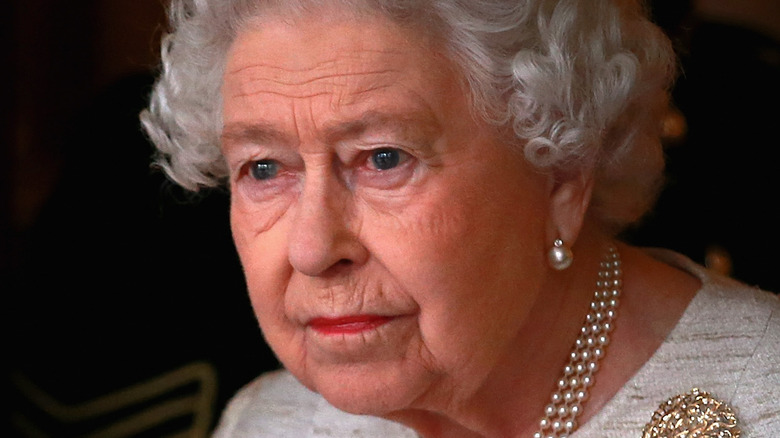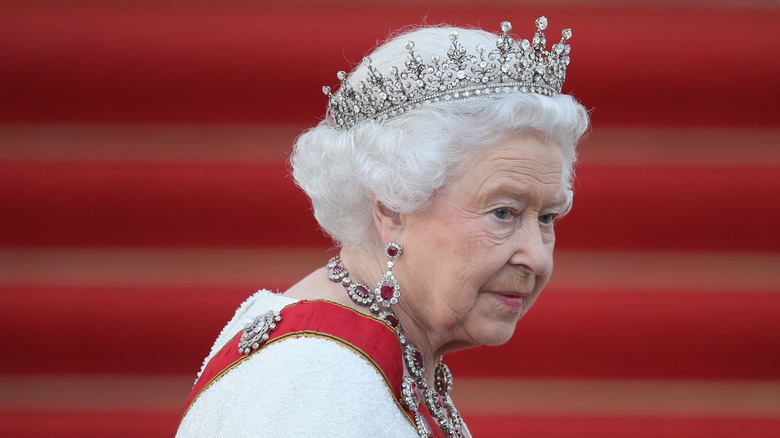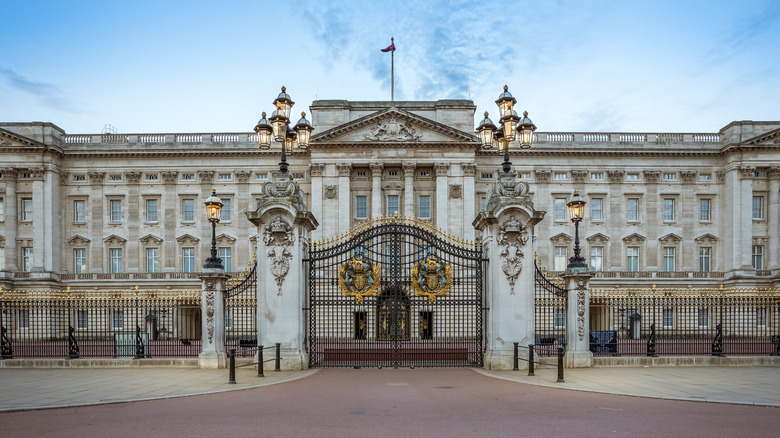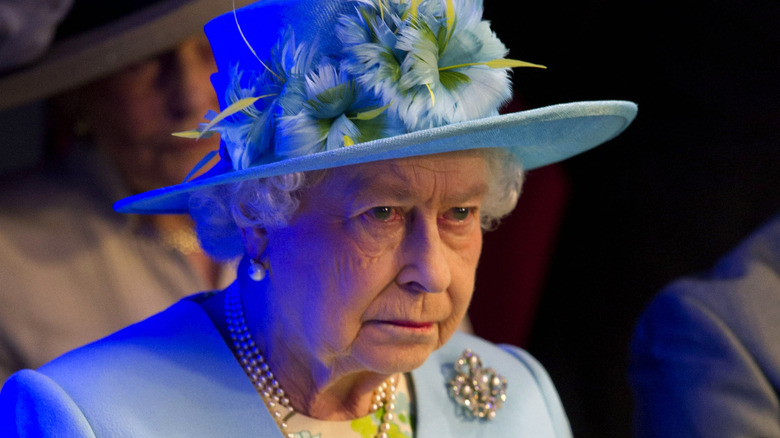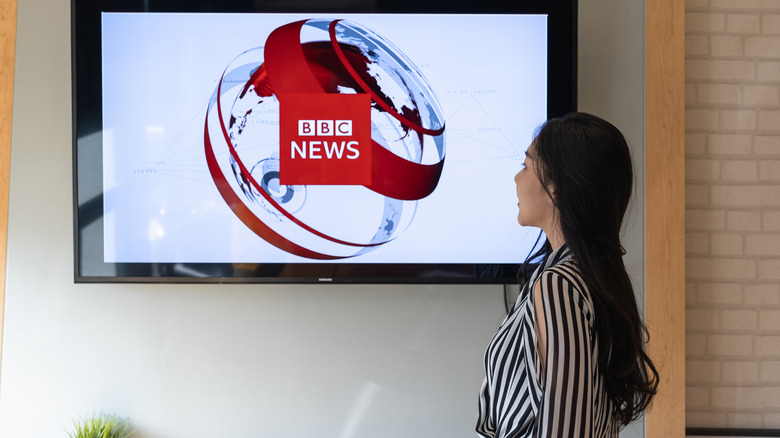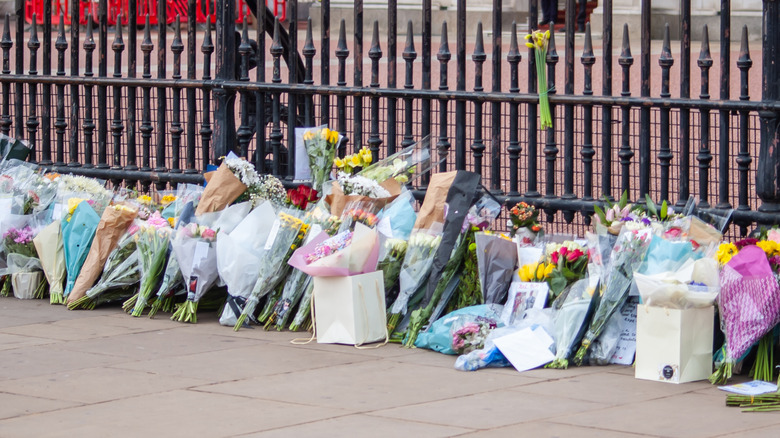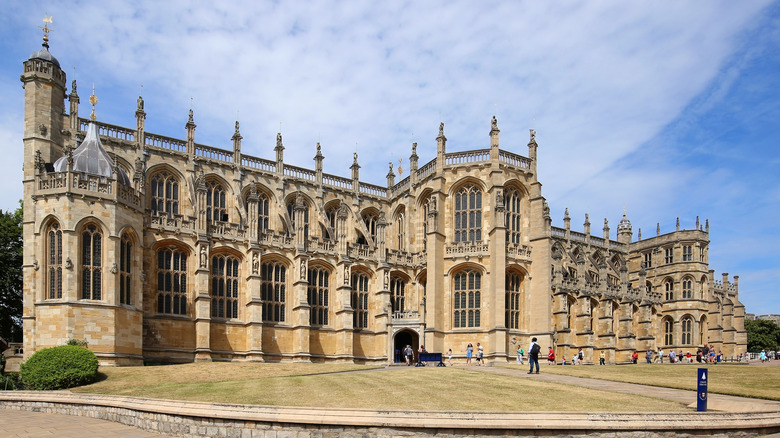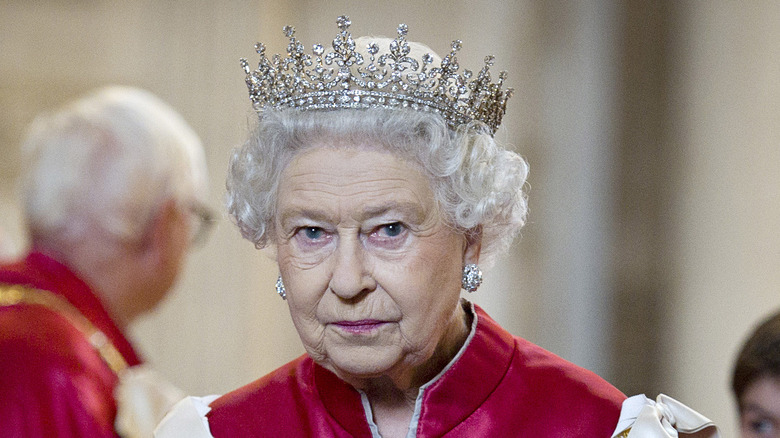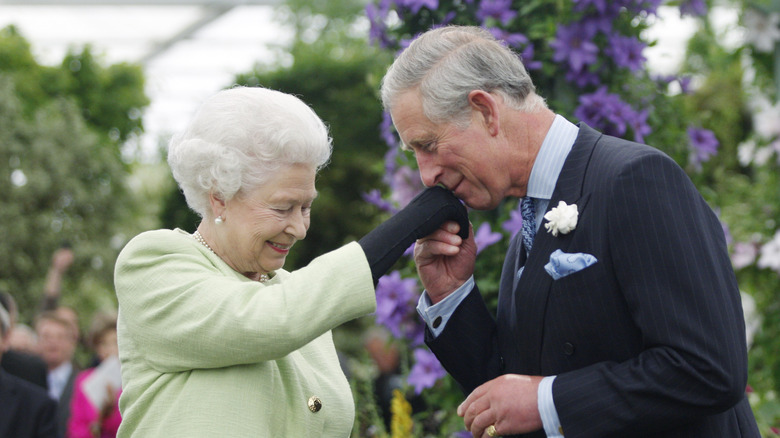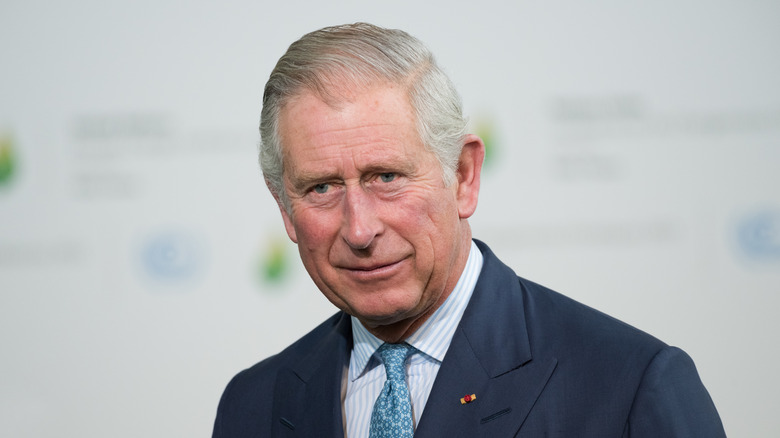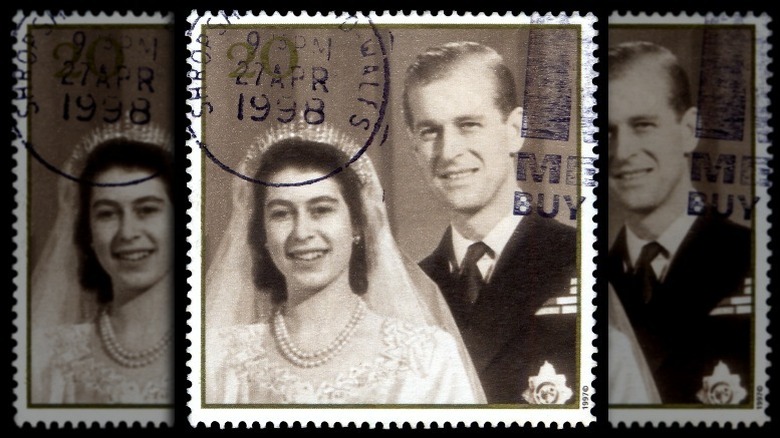What Happens When The Queen Dies
No one wants to think of that terrible day when Queen Elizabeth II dies. After all, the queen has been the head of the British monarch for longer than most of us have been alive. She's been queen since 1952, and she has actually had the longest reign of any monarch in British history. She's likely even outlived many of the world leaders she's met with over the decades she's been in power. During her reign, there have been 14 prime ministers and 14 U.S. presidents. And, at the same time she's led 54 Commonwealth countries, she's also welcomed four children, eight grandchildren, and ten great-grandchildren!
But, as she is well into her 90s, it's impossible not to accept that, eventually, that sad day has to happen. So, when that time comes, a somber series of traditional events have been planned to be put into place. For those curious about how the royal family will continue on, here's what will happen.
There's a plan and a code phrase in place for when the queen dies
The teams behind many world leaders like presidents and members of royal families have special code words used when referring to those in charge, often for security reasons. And there's reportedly a code phrase for planning what happens when the queen dies, and it sounds suspiciously like a children's nursery rhyme.
When top officials have discussed what to do in the event of Queen Elizabeth's death, the plan has been called "London Bridge," according to The Guardian, and this reported plan works out every detail, starting with how people will be told. After receiving the news from the queen's doctor, the queen's private secretary, Sir Christopher Geidt, will call the prime minister, waking them if necessary, and say the words, "London Bridge is down." Then the prime minister will presumably help set the operation into action.
This is how people will learn of the news
A huge event like the death of a monarch can, of course, create chaos, so many things will need happen at once to keep things flowing in a coordinated way.
According to The Guardian, after Commonwealth nations where the queen is Head of State are informed, news of the queen's death will "go out as a newsflash to the Press Association and the rest of the world's media simultaneously." While that's happening, a footman "in mourning clothes" will post "a black-edged notice to the gates" of Buckingham Palace. We saw this after Prince Philip's death in April 2021, and much like with the death of the Duke of Edinburgh, an announcement sharing news of Queen Elizabeth's death presumably will then be made on the royal family's website, as well as on the family's social media accounts.
It's possible that the world might not know that the queen has died for a little while. According to the Daily Beast, if her death were to happen overnight, it would be announced at 8 a.m. the next morning.
TV programming will change
"It is with the greatest sorrow that we make the following announcement," said John Snagge, the BBC radio presenter who informed the world of the death of George VI. BBC was there to break the news in 1952, and when the sad day comes and the queen is gone, it seems the BBC will inform the public again.
The way it is all set to go is that first the news will hit the main TV channels and all BBC channels will share the BBC One feed, according to the Independent. It's likely that many TV reporters and anchors, especially on the BBC, will all wear black suits and ties. They reportedly keep these outfits with them at all times in case of a sad occasion. This is a really important bit of planning because, in the past, it's gone rather wrong. A BBC anchor received a great deal of backlash for wearing a red tie and a gray suit to announce the Queen Mother's death (via Daily Mail).
There will likely be other programming changes as well. In 1952, when King George VI died, the BBC stopped airing all comedy until after the funeral. It's fair to assume this could happen again.
The BBC will deliver material they have been rehearsing
It sounds morbid, but covering the death of a monarch is so very important that the media has to rehearse for it so they are ready in the moment. But those rehearsals can also backfire. In 2015, a BBC journalist was unaware a rehearsal was happening and posted on social media that the queen had died!
"A journalist working for the BBC's language services, who had not been sent the email, saw an internal TV monitor which was showing the rehearsal," the BBC Trust said in their reporting at the time (via BBC News). "A number of tweets were sent from her Twitter account. The first stated that the Queen was being treated in hospital, the second stated that the Queen had died; the tweets included a link to BBC World's official Twitter feed."
So, yes, rehearsing is important, and it's nothing new for news organizations to have pre-written obituaries or prepped stories. But hopefully everyone will know when it's a rehearsal and when it's the real thing.
Then it will be time to mourn Her Majesty
When a monarch dies, the whole country goes into a national state of mourning. Flags will fly at half-mast across the U.K. and workers may be sent home early, according to The Guardian. The U.K. financial markets will also likely close early that day, which could have ramifications on the economy.
Traditionally with the death of previous kings and queens, the day the queen dies will be followed by an official 12-day mourning period, according to the Mirror. During this time, a lot will happen, including the transport of Queen Elizabeth's body. Her Majesty's coffin will lie in state in Westminster Hall for four days with people allowed to visit to say their goodbyes 23 hours a day (via Insider). However, this did not happen when Prince Philip died because of U.K. precautions during COVID-19, so plans may vary depending on public health considerations.
While it's hard to say exactly how Queen Elizabeth's funeral will play out, as COVID restrictions could potentially still be in place, there could be hundreds of thousands in attendance. For example, more than 200,000 people paid their respects to the Queen Mother upon her death in 2002 (via Express).
This is what Queen Elizabeth's funeral might look like
While watching the funeral of Prince Philip, it wasn't hard to imagine that the queen's funeral may be similar. However, the reality is that Her Majesty's final service may be quite different. As the sitting monarch, Queen Elizabeth will have a state funeral, while Philip's was a ceremonial funeral.
While ceremonial funerals and state funerals sometimes look somewhat similar, state funerals are bigger, whereas ceremonial funerals are often more intimate. However, The U.S. Sun explains, a ceremonial funeral is similar to a state funeral in that the deceased will be lying in state, there will be a procession with a gun carriage, and the military will be involved. Still, ceremonial funerals are very important; in fact, that's what Princess Diana's was. However, state funerals are much more rare, notes The U.S. Sun, because they're usually just for reigning monarchs.
According to the Mirror, the Archbishop of Canterbury will lead the service for the queen's funeral.
Here's where Queen Elizabeth will be buried
After Queen Elizabeth's funeral, it will be time to lay Her Majesty to rest, and it's believed the most likely spot the queen will be buried is at St. George's Chapel at Windsor Castle, specifically the King George VI Memorial Chapel. The Queen Mother and King George VI were buried there, as was the queen's sister, Princess Margaret.
However, that's not necessarily where Queen Elizabeth will be buried for certain. The reason? It's believed, according to the Independent, that Prince Philip (who's currently buried in the royal vault at St. George's Chapel) will ultimately be buried at Frogmore Gardens, where Queen Victoria and Prince Albert were also buried (via Express). If that were to happen, it's fair to assume that the queen would want to be laid to rest with Philip — but at this point, it's all speculation. Likely only the queen, her family, and her staff know her plans.
Queen Elizabeth's son Prince Charles will ascend the throne
When the queen dies, Prince Charles will automatically become king, but a coronation will be planned for sometime later on. If Prince Charles chooses to keep his own name (royals can actually choose another name when they take the throne), he will be known as King Charles III.
Everything that happens from this point on is very ceremonial. When Charles becomes king, part of the process is that he will need to swear an oath called the accession declaration, according to the royal family's website. Once he does that, the proclamation will be read at certain locations, flags that have been at half-mast amid mourning will rise, and there will be a royal gun salute.
At that point, Charles is king. The coronation, however, won't happen for months in order to allow time for a mourning period and to prepare for the ceremony, according to Town & Country. Notably, there was a 16-month gap between the death of King George VI and the queen's coronation in 1953.
The new king will have a coronation
Since his birth, there was never any doubt that, barring his own abdication or death, Charles would be made a king upon the death of his mother. The Prince of Wales is the queen's eldest child, meaning, from birth, it was his responsibility to be next in line for the throne. The same can be said for Prince William and his son Prince George. The firstborn of the firstborn will always be next in the line of succession.
It is thought that Prince Charles and his wife, Camilla, will move out of Clarence House, where they currently live, and into Buckingham Palace when Charles becomes king, according to the Daily Star. However there's a chance that won't happen. Sources told The Sunday Times that Charles may not want to use Buckingham Palace as a royal residence and may instead just treat it as his office.
Additionally, some believe that Charles will choose a new name — maybe Philip after his father — because King Charles I and King Charles II were associated with the English Civil Wars, and that's bad mojo. But according to The Constitution Unit at UCL, there are a few ways this can go. "Instead of becoming King Charles he might choose to become King George VII, or King Philip, or King Arthur."
There will be a new national anthem, new money, and new stamps
Ever since Queen Elizabeth took the throne, the anthem has been "God Save the Queen." But that's going to change once Prince Charles takes the throne, and the country returns to an anthem that has actually been a lot more historically used. "God Save the King," which dates back to 1745 in London, will be the new anthem, as there will once again be a king on the throne instead of a queen. But there won't be a whole lot of new memorizing of the anthem. The current anthem is very similar to the original one. It just replaces "queen" for "king"!
Another change will be that Charles' face will be on money and stamps. Eerily, according to Express, it's rumored that Prince Charles has already posed for the portraits that will be used on the new money and stamps when the time comes. However, the money and stamps currently in circulation will not immediately become worthless. They may even be considered by some to be collector's items. According to MyLondon, that money will be "gradually phased out" as more of the new currency is created and used more widely.
